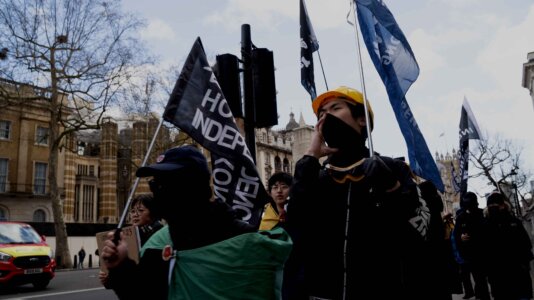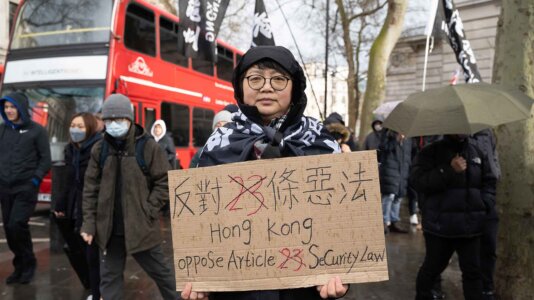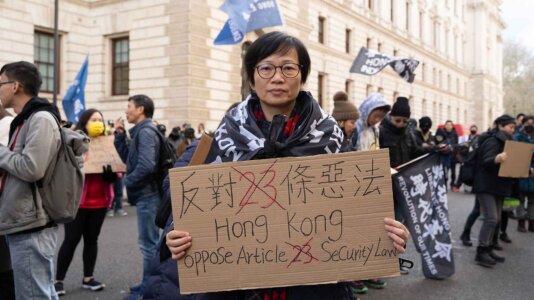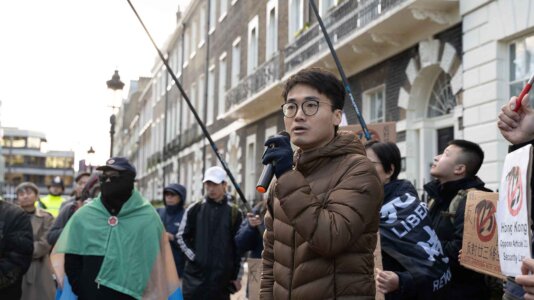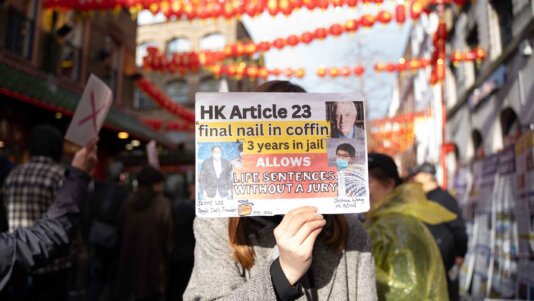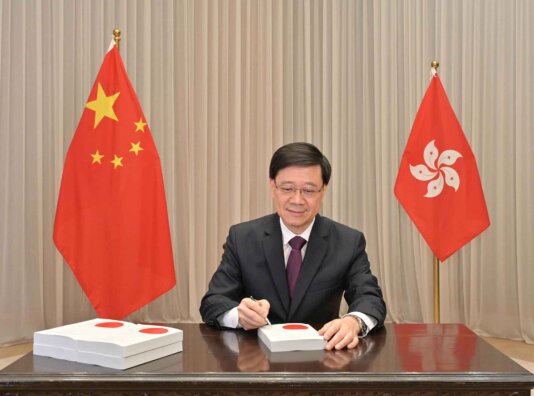- About
- Topics
- Picks
- Audio
- Story
- In-Depth
- Opinion
- News
- Donate
- Signup for our newsletterOur Editors' Best Picks.Send
Read, Debate: Engage.
| March 28, 2024 | |
|---|---|
| topic: | Political violence |
| tags: | #Hong Kong, #democracy, #freedom of speech, #China |
| located: | Hong Kong |
| by: | Vanesse Chan |
Hundreds of protesters marched through the streets of London on 23 March in opposition to Hong Kong’s latest national security law known as Article 23, days after it was unanimously approved by the city state's legislature.
Critics express concern that the controversial law will further diminish the freedoms of the Chinese-ruled city and negatively impact its financial standing.
Some protesters held up signs labeling the law "evil," and decried it as the "final nail in the coffin" for Hong Kong's democracy.
Lily Ho, one of the protesters, criticised the lack of public consultation on Article 23. Authorities, meanwhile, touted a nearly 99 per cent support following a one-month consultation period.
In 2020, China imposed an already stringent national security law in the former British colony, criminalising secession, subversion, terrorism and collusion with foreign forces, among other offences.
As of 23 February, local media report that nearly 300 individuals have been apprehended for alleged violations of the national security law since its enactment. Of these, 174 people and five companies have faced charges.
Numerous high-profile overseas activists are being sought after by Hong Kong police as part of a sweeping political crackdown, and many others in the city have been languishing in jail awaiting trials.
Hong Kong Chief Executive John Lee consistently argued that the city has the
"constitutional responsibility" to complete the legislation of Article 23, as mandated by the Basic Law - the territory’s mini-constitution.
Article 23 of the Basic Law stipulates that Hong Kong "shall enact laws on its own" to prohibit seven types of national security offences. However, since its handover in 1997, such legislation has never been passed.
Under article 23, which covers a wide range of offences including treason, sabotage, sedition and the theft of state secrets, violators could face penalties up to life imprisonment.
The national security loopholes, authorities said, led to what they called "social chaos" and the 2019 protests, which at times descended into violent clashes between protesters and the police.
Calling the legislation a "glorious mission," Lee argued that it allows the city to "prevent, suppress and punish espionage activities, conspiracies and traps from foreign intelligence agencies, and infiltration and sabotage by hostile forces."
Protests were planned in the UK, US, Canada, Taiwan and elsewhere on Saturday, 23 March, to oppose the new law. FairPlanet spoke to protesters at the London protest.
Hundreds had gathered outside the Foreign Office in Westminster, chanting slogans advocating for Hong Kong independence - a stance prohibited in Hong Kong by the national security law imposed by Beijing.
49 year-old Sofia Law told FairPlanet that she fled to Britain after being arrested for charges related to the 2019 anti-extradition protests, and that she fears Article 23 will "further destroy Hong Kong’s democracy and freedom."
Several self-exiled activists addressed the crowd at the rally, including Simon Cheng, a high-profile pro-democracy figure with a HK$1 million bounty by Hong Kong police, and Tony Chung, a former leader of the pro-independence group Studentlocalism. Chung had been imprisoned under the city's national security law prior to escaping to Britain.
Chinese and Hong Kong authorities said the newly enacted laws are necessary in order to seal "loopholes" and "restore stability" following the 2019 protests that erupted over a controversial bill that sought to permit extradition to mainland China from Hong Kong.
The passage of the legislation instantly triggered a wave of condemnations from countries including the UK, the US, Australia, Canada and Japan, which expressed concerns regarding the wide implications of the law.
In a joint statement led by the US-based non-profit Hong Kong Democracy Council, 145 community groups and advocacy organisations condemned the passage of Article 23.
"Article 23’s chilling effect on the freedom of expression extends to the Hong Kong diaspora globally, as the new law applies to Hong Kong residents anywhere in the world," the statement wrote.
In late February, Johannes Chan, an adjunct law professor at the University of Hong Kong, together with a group of lawyers from the Hong Kong Rule of Law Monitor, issued a statement expressing their concerns over what they termed the "draconian" nature of Article 23.
Referencing the legislation's use of "intent to endanger national security," the lawyer community criticised the term as "fluid, ambiguous, and sweeping." They claimed it lacks clarity on what constitutes "endangering national security" and the extent of harm required.
Following the passage of Article 23, Britain updated its travel advisories on Hong Kong and warned citizens that the laws can be "interpreted broadly." UK’s Foreign Secretary David Cameron said it will "make it harder for those who live, work and do business in Hong Kong."
The United States Secretary of State Antony Blinken also criticised the "vaguely defined provisions" regarding "sedition," "state secrets," and interactions with foreign entities, adding they could be manipulated to curb dissent.
Hong Kong, meanwhile, defended its new law and slammed criticism, stating that "only invaders who want to intrude into our home" will not want Hong Kong to legislate to safeguard the country.
In 2003, Hong Kong attempted to implement Article 23, but it was eventually withdrawn after half a million people protested against the law in the streets.
Veteran pro-democracy politician Emily Lau told FairPlanet that nowadays people are not sure where the red lines are and fear getting into trouble.
"In the past few years, we have witnessed the collapse of civil society, as human rights groups, political organisations, trade unions, education groups and news organisations disappeared one after another, and many people have been arrested and charged."
Lau, a former Democratic Party chairperson, said she acknowledged Hong Kong has the "constitutional responsibility" to enact Article 23, but emphasised the administration's responsibility to implement universal suffrage as stated in Article 45 of the Basic Law, which stituplates that the Chief Executive should be chosen by "universal suffrage upon nomination by a broadly representative nominating committee."
Image by Vanessa Chan.
By copying the embed code below, you agree to adhere to our republishing guidelines.
